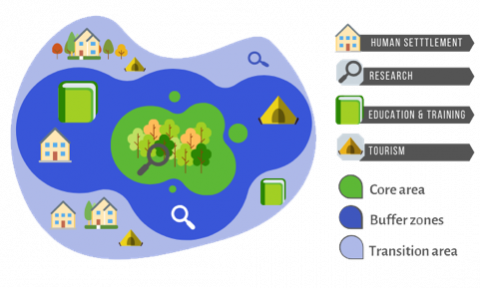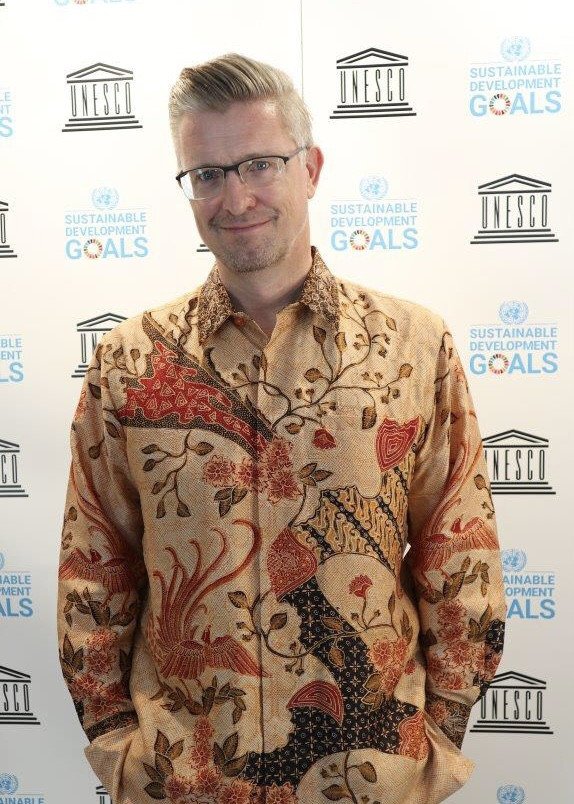
The Youth Leadership Camp for Climate Crisis 2020. Photo by UNESCO Jakarta.
The world is changing – and it is changing fast. The emergence of modern technologies and rapid shifts in social, economic, and political aspects have increased the urgency to adopt more sustainable methods of living. As a new set of challenges come to the fore, it seems necessary to think ahead instead of living only for the here-and-now.
It appears that the involvement of young people is tremendously essential to achieve sustainable development. This was also voiced by Hans Thulstrup, a Senior Programme Specialist for Water and Environmental Sciences at the United Nations Educational, Scientific and Cultural Organization (UNESCO) Office in Jakarta.
Acting a double role as Science Bureau for Asia and the Pacific and Cluster Office, UNESCO Jakarta covers the mandates of UNESCO on contributing to world peace and sustainability through education, sciences, culture, communication, and information in five different countries: Brunei Darussalam, Indonesia, Malaysia, the Philippines, and Timor Leste. Specifically, on natural sciences, UNESCO Jakarta is responsible for the tasks in all Asia and Pacific countries.
Hans emphasized, “Youth is amongst UNESCO’s global priorities. Since we are working towards a more sustainable and peaceful world, the youths are the ones who will inherit and help to shape that world.”
“We may not do our job properly if we do not involve youth in a meaningful way,” he continued.
While undertaking their mission, UNESCO Jakarta promotes numerous programs that involve young people. It is evident through various activities such as essay and video making competitions on water and climate-related issues, which were held in the lead of the release of UNESCO’s world water development report.
Back in 2017 and 2020, UNESCO Jakarta also held Youth Leadership Camp for Climate Change, gathering 150 participants from all around Indonesia, the Youth Leadership Camp for Climate Change 2017 aimed to raise climate change awareness of Indonesian Youth. The camp also covered a series of workshops that focused on communication strategy in disseminating the importance of climate change adaptation and mitigation.
Adhe Lignita Wulandari from UNESCO Jakarta also shared her opinion on the success of this program.
“It was indeed a successful event. Some of the Alumni (of this program were) even invited to the UN Summit for The Climate Change, as one of the delegations from Indonesia.”
Nonetheless, she stated that the most important thing about these activities is to engage young people and ensure they understand the program’s essential meaning and objectives.
Conducted in three UNESCO Designated-Sites: Cibodas Biosphere Reserve, Gunung Leuser National Park, and Bukit Barisan Selatan National Park and Belambangan Biosphere Reserve, the camp also acted as a support for UNESCO’s Man and the Biosphere Program.
The Man and the Biosphere (MAB) Program
The MAB is a UNESCO program that aims to establish a knowledge base to understand the relationship between people and the environment. This program focuses on UNESCO’s sites that are known within the World Network of Biosphere Reserve.
Divided into three zoning areas, Biosphere Reserve is UNESCO’s designated site with the purpose to conserve nature, support sustainable local development and provide logistic support such as education, research, and information sharing. Through communication and data sharing between these sites, biosphere reserves are expected to give a ground-through picture of how people influence the environment.
As we celebrate the 50th anniversary of the MAB Program this year, Hans explained why Biosphere Reserve is unique and indeed essential to contribute to sustainable development.
“Biosphere Reserves are beyond the protected areas because it also involves the surrounding (whether) developed, the degraded, and urbanized areas. We are not just looking at protecting a certain area of land or sea, but also in the interplay between human and nature,” he stated.
In Indonesia itself, according to LIPI, as of October 2020, there are currently 19 biosphere reserves as follow:
- Cibodas
- Komodo
- Lore Lindu
- Tanjung Puting
- Gunung Leuser
- Siberut
- Giam Siak Kecil – Bukit Batu
- Wakatobi
- Bromo Tengger Semeru-Arjuno
- Taka Bonerate-Kepulauan Selayar
- Belambangan
- Berbak – Sembilang
- Betung Kerihun Danau Sentarum Kapuas Hulu
- Rinjani Lombok
- Saleh-Moyo-Tambora or ‘SAMOTA’
- Togean Tojo Una-Una
- Bunaken Tangkoko Minahasa
- Karimunjawa-Jepara-Muria
- Merapi Merbabu Menoreh
Click here to read more about the 19 biosphere reserves in Indonesia.
UNESCO Water Resilience Challenge 2021
To carry on its efforts in conceiving sustainable development and increasing the participation of young people, UNESCO Jakarta, in collaboration with The Water Agency, organizes a capacity-building program for university students and young professionals, UNESCO Water Resilience Challenge 2021.
The program will focus on tackling water-related issues in Sembalun District, which took place in Rinjani-Lombok Biosphere Reserve and UGGp (UNESCO Global Geopark). Twenty-five participants from across Indonesia with various backgrounds of education will compete in groups to address the real issues in 3 concept solutions: Water for Living, Water for Food, and Water and Safety.
“When we talk about Rinjani-Lombok, particularly this area (Sembalun District), it is subjected to extreme water-related events over the recent years. There are both flood and drought events. In a way, we have a place that is illustrative of what we might expect to see more of in the future due to the increasing impact of climate change and other extreme events,” Hans said.
“If we talk about a site that has a significant history of the extreme event, I think it will also be very interesting to see how the communities have adapted. If there is something in the local knowledge and practice that we can learn from and replicate to elsewhere.” he continued.
Due to the current pandemic situation, the Challenge will be held fully online in 3 phases – allowing the participants to experience a virtual site visit, learn the factual issues from the local stakeholders, and mentored by national and international experts.
Download PDF File Here
To equip participants with the best experience in executing the Challenge, UNESCO Jakarta and The Water Agency partner up with some of the best in the field, namely Alliance for Water Stewardship Indonesia, ICLEI Indonesia, Nazava, Resilience BV, and Urban+ Institute. These institutions will act as the participant’s mentors and guide them to look at the bigger, complex picture and untangle the issues.
The local institutions, namely Balai Taman Nasional Gunung Rinjani, Indonesian National Commission for Man and Biosphere Program (LIPI), Rinjani-Lombok Biosphere Reserve and UGGp (UNESCO Global Geopark), and Destination Management Organization Sembalun, will also support the program as experts to ensure and provide the participants with the local context from the local’s representative, making sure the participants listen to the all the voices.
“We really hope the participants of this water challenge can grasp the idea of the program, (to understand) the water challenges that happen in Sembalun, also to convey the message and attract other young people to be involved in these activities.”
Hans also shared his view saying, “We hope to empower young people to be a part of this decision-making process and to give them feasibility, exposure, and insights into water management. Genuinely, we have a lot of confidence in young people that they will come up with approaches and ideas that will have value in other contexts.”
“We hope it’s the start of something we can work with, in a great adapt, and more location in the future,” he concluded.
Stay tuned on Indonesia Water Portal for the latest updates about UNESCO Water Resilience Challenge 2021!
About the Speaker
Hans Thulstrup
Having the experiences to work in many different countries with UNESCO for 25 years, Hans is currently a Senior Programme Specialist for Water and Environmental Sciences at UNESCO Office in Jakarta. He has been involved in numerous UNESCO’s science programs, particularly in the Man and the Biosphere Program which also became the focus of his PhD degree in Scientific Communication.
Adhe Lignita Wulandari
After graduating from civil engineering with both her bachelor’s and master’s degrees, Adhe had the experience to work in construction and consulting services before pursuing her career with UNESCO. Working with UNESCO for six years, Adhe has the role in assisting to manage all UNESCO’s programs in the science sectors as well as its designated sites.
Written by: Keylin Vindyra and Tri Octiviani (The Water Agency)












